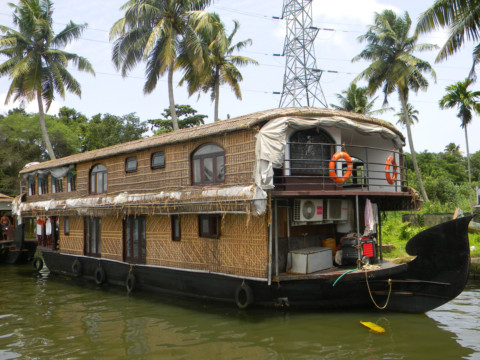
Alappuzha: Right up to March 18 when Kerala went into lockdown, the meandering canals in its backwater district Alappuzha was abuzz with domestic and international tourists, many of them enjoying their first backwater cruise along the coconut palm-fringed canals.
Exactly seven months later when the state government declared backwater tourism safe to open for tourists from October 18, the houseboat sector presents a distraught picture: Rundown houseboats that need overhaul, only a handful of tourists, a few thousand houseboat staff rendered jobless and some of the houseboat owners steeped in financial crisis.
Rocked by lockdown
President of the Kerala Houseboat Owners’ Federation, Tomy Joseph Edayadi says the lockdown and the resultant loss of business have devastated the houseboat sector.
“We are in a severe financial crisis. The boat owners are burdened with debt, workers have been rendered jobless and a return to normalcy appears far. Those who had houseboats as their sole line of business are the ones who are suffering most”, Edayadi told Gulf News.
There are roughly 800 houseboats operating in Alappuzha and Edayadi reckons that at least 25 per cent of them may be shut out of business owing to the debt piled up during the lockdown.
Maintenance burden
Tobu Pulickattil, managing director of Pulickattil Houseboats, one of the larger players in the sector operating a dozen houseboats says boat owners are faced with massive maintenance expenses after a forced idling of the boats for seven months.
“The painting, plumbing and canopy change of the boats itself will cost a few hundred thousand rupees, and several boats may require expensive engine overhaul or battery change. Many of the boat owners are in financial crisis and will find it difficult to get their boats back in shape to operate services again,” Pulickattil says.
Job losses galore
The houseboat sector in Alappuzha is estimated to employ roughly 3,500 staff directly, and nearly all of them were thrown off jobs as the lockdown was clamped.
Many of the cooks couldn’t go anywhere because the hotel and restaurant businesses also remained shut. Some of the houseboat workers turned daily wage labourers wherever they could find work, and even a few boat owners had to take up work on daily wages.
As the lockdown started biting into the houseboat operators’ revenues, at least some of them looked to innovative methods to generate some revenue and protect the jobs of at least some staff.
One of the operators converted the luxury pool in the houseboat into a pond for fish farming. There were also innovations like vegetable farming and rabbit rearing on houseboats as the boats lay idle.
Shikaras affected
Smaller boats that take tourists on day cruises, the shikaras, have also been overwhelmed by the lockdown-induced crisis. Many of the 100-odd shikaras in Alappuzha are operated by the owners themselves.
“Daunted by the debt burden, many shikara owners are trying to sell their boats, but there are hardly any buyers”, A.R. Rangan who has been operating a shikara for seven years, told Gulf News.
Viji Kakriyil, a shikara boat worker says he has struggled to pay home rent and foot his two children’s education expenses during the past seven months. “Some days I’ve got work as a mason’s helper and some other days I sold banana chips”, he says. As the boats come back into business, there is cautious optimism in the industry. Tobu Pulickattil feels that the tourism culture is embedded in Alappuzha, which will help the destination overcome the present setback.
District Tourism Promotion Council secretary Malin Muraleedharan said nearly a thousand guests had come in the first nine days since houseboat operations resumed. That is just a trickle for the tourist town, but not too bad for a start.
With the lockdown lifted, bookings are coming in even if slowly. Operators are hoping that the Christmas-New Year season will bring them some revenue, though a strong bounce back can happen only after flights and trains return to normal operations.








